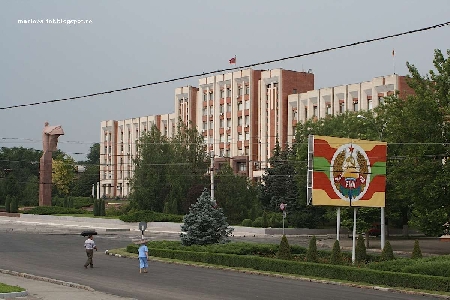Transdniester, an unfrozen conflict?
The Romanian Foreign Ministry says the adoption of the so-called state border law in Transdniester is an act of defiance that will attract the disapproval of the international community.

Valentin Țigău, 21.06.2013, 15:37
After long hours of closed-door talks on Thursday, Parliament in Chisinau failed to adopt a declaration regarding the situation in Transdniester. In recent months things have taken a serious turn for the worse, all the more so as on June the 10th, the leader in Tiraspol, Yevgeny Shevchuk promulgated a law on the so-called “state border” of the breakaway region, which also includes Varnita village, east of the River Dniester, inhabited by a predominantly Romanian-speaking community which accounts for 80% of the local population, and currently under Moldovan authority.
Chisinau has criticised the decision, while experts fear the latest developments might spiral into an armed conflict. Transdniester is the commonly used reference for the so-called Pridnestrovian Moldovan Republic, a breakaway region, which de jure continues to be under the territorial sovereignty of the Republic of Moldova. Seen as an autonomous region at international level, it proclaimed its independence in 1990, accusing Moldova for seeking union with Romania.
Internal tension spiralled into civil war in 1992, when the Russian army also intervened, on the separatists’ side. The region has a majority Slavic population, particularly Russians and Ukrainians, with the Romanian-speakers accounting for 40% of the overall population. The separatist authorities control Moldovan territories east of the Dniester River as well as six other communes and the city of Tighina, located west of the Dniester.
Moldova has criticized this week’s vote of the “state border” law, while some political pundits argue a new war between the two states is imminent. Against this background, Moldovan Defence Minister Vitalie Marinuta says the army is ready to retaliate to any prospective attack launched by the forces of the breakaway regime.
In turn, Moldovan president Nicolae Timofti agreed to the idea that the series of provocations have to do with Moldova’s rapprochment to the European Union. Timofti hinted at the Russian Federation’s interest to cause instability in the Dniester region. Russian Deputy Foreign Minister Grigory Karasin has recently said in an interview that his country cannot withdraw ammunition from Transdniester for fear Chisinau might obstruct the political resolution of the conflict.
The new law adopted in Tiraspol is due to come into effect starting next week, although it has already prompted disgruntled reactions from the OSCE, the US and Romania. The Romanian Foreign Ministry has labelled it an act of defiance, which will attract the disapproval of the international community. The Ministry has already sent a message in that respect to the Irish presidency of the EU.






























